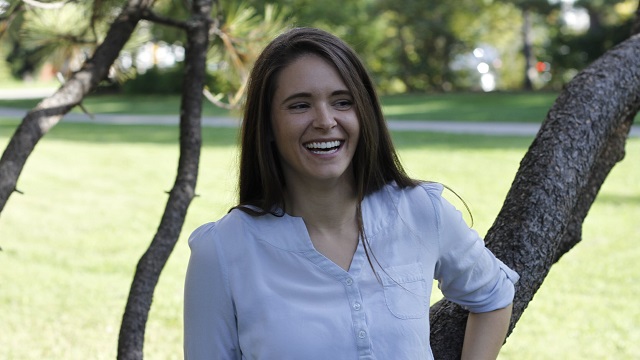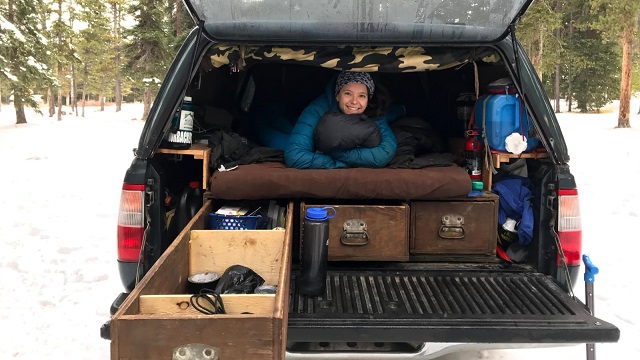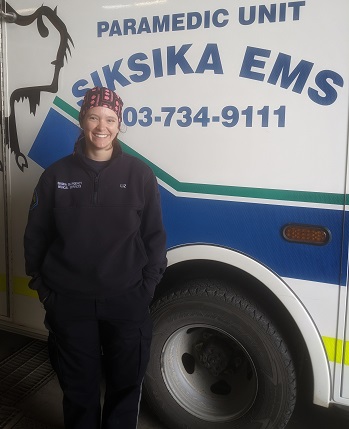
"I'm really excited, especially for the opportunity to do rural emergency department coverage and Indigenous health, which is what I want to do for my future career," says Liz Cook, graduate of the MD class of 2020.
It might be a bit of an understatement to say that Liz Cook, '20 MD, loves the outdoors. She skis. She bikes. She rock climbs. She even built a camper on the back of her 1995 Toyota T-100 truck specifically designed to fit her skis, alongside a pullout kitchen complete with sink. The big city is not where you'll find her.
That adventurous spirit, combined with a passion for helping people, has taken her across the province providing health services in small communities in one form or another. And although she always knew she wanted to be working in medicine, the Calgary-born and Chestermere/Strathmore-raised Cook took a bit of a winding path to get to her medical degree, with several detours along the way.
The many sides of health care
"I've been on many different sides of health care, from first response/rescue and pre-hospital care to hospital-based medicine," Cook says. "I think I'm kind of unique in that I came into medical school knowing that I wanted to be a rural family doctor, but I explored other health-care careers before going into medicine. Those experiences actually became the driving force behind me going to med school."
After graduating high school, Cook attended the University of Lethbridge, but soon had a change of direction. Merging her passion for medicine with her love of the great outdoors, Cook quickly found a job with the Winsport Ski Patrol as an emergency medical responder. From there, she became an emergency medical technician, which brought her to Cadotte Lake, a small Indigenous community in northern Alberta.
"I took the ambulance job in Cadotte based on a recommendation from a friend. It was my first ambulance job and I was completely inexperienced," Cook says with a laugh. "It was very intense. We were a basic life support ambulance and our nearest backup of any kind was about an hour away. So it was just me and my partner and we had to manage everything on our own, and in isolation which made it 'sink or swim' type of learning."
Cook says this time in Cadotte Lake gave her hands-on experience in emergency medicine she doesn't think she would have received anywhere else. It also opened her eyes to a career path she could not resist taking.
"I learned a lot during that time, about emergency care especially, and I had to learn very quickly!" she says. "But I also learned that I really, really liked Indigenous health, and I really liked being part of that community."
"Because we were in such isolation, the EMTs became a primary point of contact for community members looking for medical advice or help," Cook recalls. "We did a lot of primary care up there, and even though it wasn't the job we were originally trained for, it was the part of the job I enjoyed the most. It became the driving force behind my decision to go back to university and then to medical school."
Inspired by her EMT experiences, Cook completed her Bachelor of Sciences degree at the University of Calgary, focusing on neuroscience. During this time she became one of four co-founders/developers of the University of Calgary's Student Medical Response team, and completed her honours thesis on first responder mental health. She was then accepted into the University of Alberta Faculty of Medicine & Dentistry's MD program.

The path to rural family medicine
As soon as she could, Cook took full advantage of the faculty's robust rural medical education opportunities. Not only were nearly all her elective courses related to rural family medicine, in her first year, she took part in the Rural Shadowing Experience offered by the Division of Community Engagement. Designed for first- and second-year students, the program matches students with rural physicians allowing them to job shadow for 12 hours over the course of a few weekends.
In her second year, Cook took part in the Pre-Clinical Networked Medical Education Program, spending four weeks in Peace River.
"When I was in Peace River, that really solidified it in my mind that rural medicine was where I wanted to be," she says. "I got to see a lot of the same patients that I had seen in Cadotte Lake in the clinic in Peace River and in the emergency department. I really liked that experience of being able to connect with someone in a primary care setting and then also be there for them in emergencies."
"I even got to help deliver a baby from a patient that I had met previously as an EMT!"
In her third year, Cook jumped at the chance to be part of the Rural Integrated Community Clerkship, which found her placed in Slave Lake for nearly a year. It was there that Cook found inspiration for the type of rural physician she wanted to be.
"My preceptor in Slave Lake, Cara Robertson, was probably the most important mentor I had in medical school," Cook says. "She demonstrated exactly what I wanted to be in a family physician: she had a casual approach with her patients and was able to connect with them on a personal level. It really taught me that if you can connect to someone on a personal level and get them to feel comfortable around you, it makes for much better patient care because they're able to open up to you. I really look to that as the model for how I approach patient care."
Now, fresh out of medical school and starting on her two-year residency, Cook is returning to Lethbridge, though she doesn't expect to be in the city for very long.
"The great thing about the Lethbridge program is that the main site is in Lethbridge, but it serves a wide area and we do a lot of our training in rural Alberta," she says. "I just got my schedule for my first year, and I'll be in Camrose for two months and then Pincher Creek for two months.'
"I'm really excited, especially for the opportunity to do rural emergency department coverage and Indigenous health, which is what I want to do for my future career."
 The COVID-19 detour
The COVID-19 detour
Even when papers were due and finals were quickly approaching, Cook never passed up the opportunity to work in the community. At the same time that she was finishing off her undergraduate degree, she was also working for Siksika Nation Emergency Services as an EMT in Siksika Nation, a large Indigenous community about an hour east of Calgary. Because of its importance to her, Cook has made it a priority to maintain this job for the past seven years.
So when the coronavirus hit Alberta, Cook immediately went to work helping them in their preparation and response to the pandemic.
"Siksika Nation has been very forward-thinking in their approach to COVID-19, and we currently don't have any cases on the reserve right now, which is absolutely fantastic," Cook says. "Over the past month I've done a couple of emergency EMS shifts, but I've mostly been working on the COVID Response Unit, which does all of the testing for COVID-19."
For a couple hours a day, Cook says, she and her colleagues run a drive-through COVID-19 test site for community members. The team also does home calls for patients who have transportation or mobility issues.
In addition to testing, Cook says she and the rest of the team are heavily involved in education about the virus, helping people understand what self-isolation is and connecting them to community resources that help them stay in their houses. This includes services that pick up and deliver groceries or prescriptions.
Cook is also part of the Community Paramedic team that supports Siksika Health Services in their proactive plans to contain COVID-19, if cases were to arise on reserve. The plan includes an isolation centre, and identifying those who would provide health services to the sick. Though she wishes the pandemic had never started in the first place-and is understandably disappointed she won't be able to walk across a convocation stage-Cook is thankful for the unique opportunities it has provided.
"Being able to return to a community that has had such a profound impact on my journey to medicine, and being able to reconnect with my paramedic colleagues that have inspired me along the way, has been an incredible way to celebrate being done medical school," she says.
"The role we've been able to play in the community has been really fulfilling. There has been a lot of mutual respect between health services and the community amidst the pandemic. Community members have been extremely welcoming and supportive, and that's honestly the part I've enjoyed the most."
Forging a new trail
As for the future, Cook isn't entirely sure where she'll end up when her residency is over, but she hopes she's able to keep practising in one of southern Alberta's small towns.
"I'd like to stay in southern Alberta, where my family is, and where I'm close to outdoor recreation like mountain biking and skiing," she says. "I'm looking forward to a career in rural medicine where I can have a diverse practice, but also be close to the support that I value in my life that will help me keep a long, healthy and balanced career."